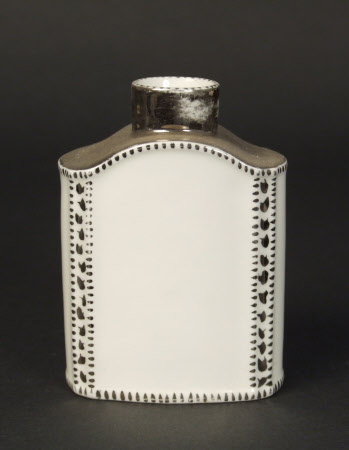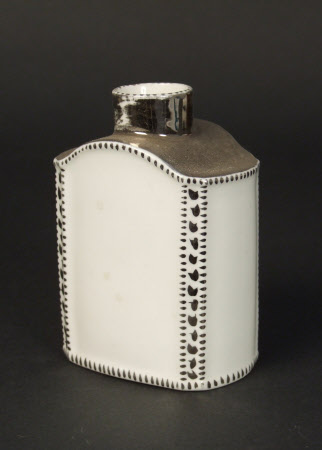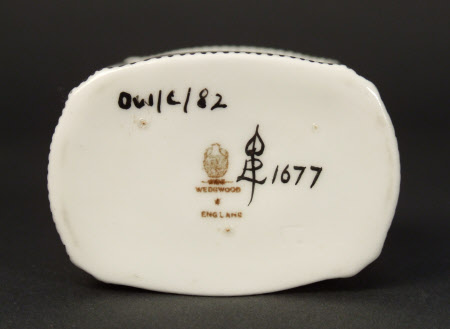Tea caddy
Louise Powell (1882-1956)
Category
Ceramics
Date
1910 - 1920
Materials
porcelain with silver or platinum lustre
Measurements
93 mm (H); 67 mm (W); 45 mm (D)
Place of origin
London
Order this imageCollection
Owletts, Kent
NT 1410876
Summary
Tea canister, bone china, commode shape with flat base, curved shoulders leading to short upright neck, decorated by Louise Powell in London, made by Josiah Wedgwood & Sons Ltd, Etruria, Stoke on Trent, ca 1910-20; decorated by hand in platinum or silver lustre, applied solid to the neck and upper shoulder, with a pattern of dashes following the vertical and horizontal lines of the mould.
Full description
Ada Louise Powell (née Lessore) was a talented painter, calligrapher and embroiderer. She is best known for the intricate, hand-painted ceramics she produced as an independent artist working with pottery manufacturer Josiah Wedgwood & Sons. Powell was from a creative family and ceramics were in her blood. Her grandfather Emile Lessore trained at the Sèvres porcelain manufactory in France, before moving to England and joining Minton, later becoming a design consultant for Wedgwood. Her father, Jules, and her sister Elaine Thérèse also painted Wedgwood ceramics. Powell trained in calligraphy and illumination at the Central School of Arts and Crafts in London. An important early commission was the remarkable work she undertook to complete an unfinished illuminated manuscript translation of Virgil’s Aeneid by William Morris (1834–96). The expression, line control, rich level of detail and use of jewel-like colour that she learned through her training translated beautifully into ceramic painting. Following her marriage to Alfred Powell, Louise began to focus on ceramics. From their studio in Red Lion Square, London, the Powells designed and decorated Wedgwood blanks (undecorated pots), which were sent back to the company factory in Etruria, Stoke-on-Trent, to be fired and sold, often through the London retailer and glassmakers James Powell & Sons. The Powells regularly visited Wedgwood, where they studied the historic pattern books and trained the factory’s decorators in hand-painting on earthenware (at the time, ceramics were decorated mostly by printing). The Powells’ relationship with Wedgwood lasted for 40 years and their work firmly re-established the company’s reputation for artistry and traditional craftsmanship. Many of the artists they nurtured, such as Millicent Taplin and Star Wedgwood, went on to enjoy long and distinguished careers in the Potteries.
Marks and inscriptions
Underside of base: [vase] / [three stars / WEDGWOOD / ENGLAND (printed in brown) Underside of base: LP (monogram for Louise Powell, black enamel) 1677 (black enamel)
Makers and roles
Louise Powell (1882-1956), decorator Wedgwood, manufacturer
References
Good Workmanship with Happy Thought: the work of Alfred and Louise Powell, Cheltenham Art Gallery and Museum, 1992 Klarner, Rebecca ‘Ceramics as a canvas: Wedgwood blanks as an intersection between fine and decorative arts and the legacy of the Lessore family', Transactions of the English Ceramic Circle, Volume 30, pp. 83-96


